|
|
|
| Ewell was another of the professional soldiers (West Point 1840) that stayed with his state rather than the United States. In 21 years of Regular Army soldiering he only rose to be a captain; for the Confederacy he was a colonel and brigade commander within a year.
He commanded a brigade at First Manassas, but without distinguishing himself. He was ordered to attack, but did not; the upside was that the orders had been a mistake. After spending the winter of 1861-62 with the
He was incapacitated for ten months, returning only at the start of June 1863. Lee sent him (in command of 2nd Corps) to clear the Shenandoah, the strategic left flank of the forthcoming invasion of the North. Ewell was brilliant at Second Winchester, capturing virtually the whole Union garrison. Moving north, he wasn’t so good. At Gettysburg he didn’t act on his own – Jackson had not inculcated initiative in his subordinates, and Ewell’s long spell as a junior officer before the war may have limited his horizons. (He reputedly returned from foraging with one cow, enough for a company but hardly for his division.)
Lee kept him through the fall of 1863, the Bristoe Station and Mine Run campaigns, and he fought at The Wilderness. His performance was slipping; at Spotsylvania one of his divisions was over-run, bad in itself but it almost broke Lee’s center. Lee promptly removed him; his promotion to lieutenant general was only four days old. (Ewell had been stunned when his horse was knocked down; with one leg, he couldn’t ride as easily as before.) He was soon re-employed, but only to command the Richmond garrison of old men, young boys, munitions workers, and convalescents from the hospitals.
When Richmond fell in April 1865, he was adamant about destroying Government property, mostly factories and tobacco warehouses. The main magazine had about 750,000 shells and provided a tremendous fireworks display, but also spread fires through much of Richmond. Lee restored him to corps command during the retreat to Appomattox, and he was captured at Sayler’s Creek.
After his release from detention, he went to Tennessee and farmed for his remaining years. |
Kindle Available Confederate General R.S. Ewell Robert E. Lee's Hesitant Commander Richard Stoddert Ewell is best known as the Confederate General selected by Robert E. Lee to replace "Stonewall" Jackson as chief of the Second Corps in the Army of Northern Virginia. Ewell is also remembered as the general who failed to drive Federal troops from the high ground of Cemetery Hill and Culp’s Hill during the Battle of Gettysburg. |
 Civil War Nurse Barbie Part of the American Stories Collection. |
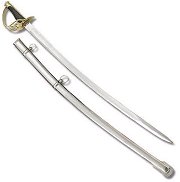 Cavalry Saber This fine replica is 39 inches overall and features a highly polished 33 inch carbon steel blade. Its leather wrapped handle fits the hand perfectly and sports decorative brass accents and a shiny brass pommel. |
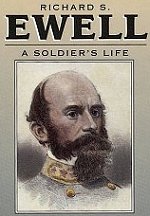 Richard S. Ewell: A Soldier's Life General Richard Stoddert Ewell holds a unique place in the history of the Army of Northern Virginia. For four months Ewell was Stonewall Jackson's most trusted subordinate; when Jackson died, Ewell took command of the Second Corps, leading it at Gettysburg, the Wilderness, and Spotsylvania Court House. |
Kindle Available The Class of 1846: From West Point to Appomattox: Stonewall Jackson, George McClellan, and Their Brothers No single group of men at West Point has been so indelibly written into history as the class of 1846. The names are legendary: Thomas "Stonewall" Jackson, George B. McClellan, Ambrose Powell Hill, Darius Nash Couch, George Edward Pickett, Cadmus Marcellus Wilcox, and George Stoneman |
Kindle Available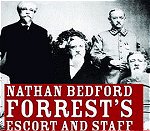 Nathan Bedford Forrest's Escort And Staff The CSA escort company and staff officers of Nathan Bedford Forrest were held in awe by men on both sides of the conflict during the war and long after, and they continue to be held in esteem as figures as legendary as Forrest himself. Not merely guards or couriers, these men were an elite force who rode harder and fought more fiercely than any others |
Kindle Available Nathan Bedford Forrest: A Biography Nathan Bedford Forrest was one of the most interesting figures from the mid-19th Century. He was also one of the most controversial -- given his role as Confederate cavalryman, Fort Pillow, and the rise of the first KKK |
Kindle Available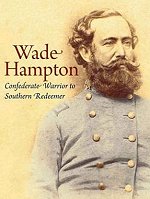 Wade Hampton: Confederate Warrior to Southern Redeemer General Wade Hampton was for a time the commander of all Lee's cavalry and at the end of the war was the highest-ranking Confederate cavalry officer |
Kindle Available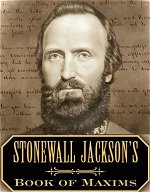 Stonewall Jackson's Book of Maxims While a cadet at West Point, Jackson collected maxims as part of his quest for status as a gentleman, and in the mid-1850s he carefully inscribed these maxims in a personal notebook, which disappeared after his death in 1863. In the 1990s, the author discovered the long-lost book of maxims in the archives of Tulane University |
Kindle Available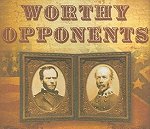 Worthy Opponents: William T. Sherman and Joseph E. Johnston: Antagonists in War-Friends in Peace If Confederate President Jefferson Davis had left Gen. Joseph E. Johnston, one of its most effective generals, in command of Atlanta's defenses, the city might have been preserved. Edward Longacre offers a new perspective on Sherman's and Johnston's military histories, including their clashes at Vicksburg, Kennesaw Mountain, and Bentonville |
Kindle Available Stonewall Jackson at Cedar Mountain At Cedar Mountain on August 9,1862, Stonewall Jackson exercised independent command of a campaign for the last time |